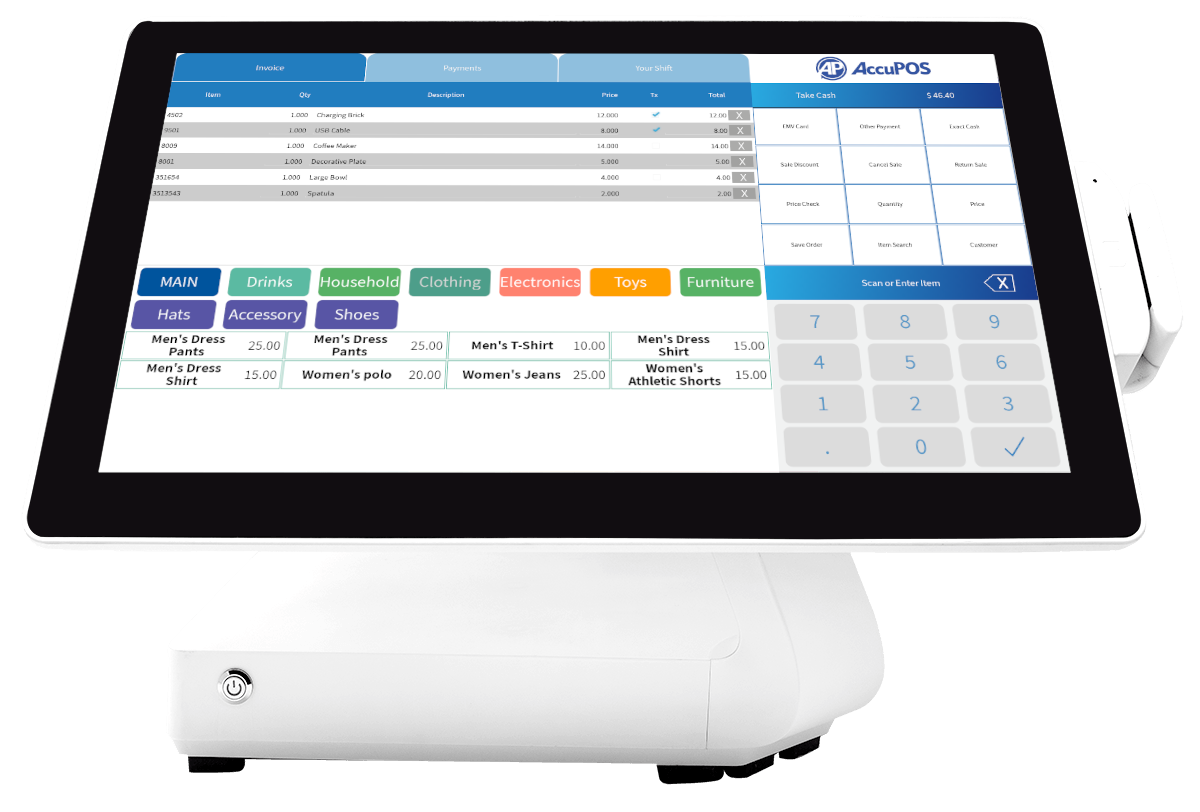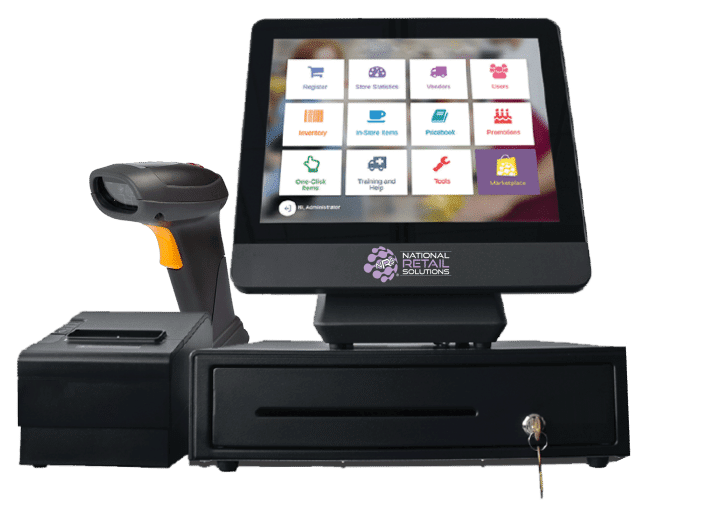The Main Principles Of Pos Machine
The Main Principles Of Pos Machine
Blog Article
Point Of Sale - The Facts

Pos System for Small Business: Retail Point-Of-Sale Solutions Streamline Transactions
Everything about Clover Pos

Hardware Elements of a Point of Sale System What makes a POS system tick? It's not simply software application; the hardware plays a starring function. Think about it as the body to the software application's brain. Without the best hardware, even the most advanced POS software is just a quite face. Vital POS Hardware So, what are the must-haves? Let's simplify. The central processing unit, often a computer system or tablet, is the heart of the operation. The screen or touchscreen display allows personnel to interact with the system. A barcode scanner accelerate the checkout process. Remember the days of by hand entering each code? The dependable invoice printer offers customers with a record of their purchase. A money drawer keeps your money safe and organized. A card reader enables consumers to pay with credit or debit cards. Diving Deeper: Beyond the Fundamentals But wait, there's more! Depending upon your organization, you might need specialized hardware. A dining establishment might include cooking area printers to relay orders, while a retail shop may utilize label printers for product tagging. Ever wonder how your regional bakery instantly prints those delicious-looking labels? Selecting the Right Hardware: A Balancing Act Selecting the ideal hardware isn't just about buying the most costly devices. It's about discovering the sweet spot between functionality, toughness, and budget plan. A small organization simply starting out might choose a more get more info standard setup, while a high-volume retailer will require robust, high-performance devices. Is it much better to purchase brand-new or used? Consider your choices thoroughly. A new system uses the most current technology and service warranty security, but a reconditioned system can conserve you money. The Future of POS Hardware What does the future hold? Expect to see much more integration with mobile gadgets, biometric scanners for worker authentication, and advanced analytics dashboards showed on larger, clearer screens. Imagine a world where inventory is immediately updated in real-time as items are scanned-- a world where you can track your very popular item from anywhere in the world. The possibilities are endless, and the hardware is constantly progressing to fulfill the needs these days's businesses. Are you prepared to upgrade your point of sale system?
Software Application Features and Capabilities: The Heart of Your POS System
Ever enjoy a skilled barista move through a busy early morning rush? Their trick isn't simply caffeine; it's a seamless dance with their POS system. The software is the conductor of your organization symphony, orchestrating everything from sales to stock. What notes should you be listening for? What capabilities genuinely matter in today's market?
Stock Management: Beyond Counting Beans
Forget spreadsheets that haunt your dreams. Modern POS systems use real-time stock tracking, alerting you when your stock of artisanal coffee beans dips precariously low. Consider it as a digital guardian angel, preventing those uncomfortable "Sorry, we're out!" minutes to clients. What if you could also predict need based upon historic data? Numerous systems now offer forecasting tools, an effective weapon versus overstocking and lost sales. This assists avoid the dilemma of running out of popular products or accumulating excess inventory of slow-moving products, both of which can constrain capital and area.
Sales Reporting and Analytics: Decoding the Information
Sales data is the new gold, and your POS system is the miner. Forget feeling in one's bones how much you sold today. Dive deep into the data to discover trends, determine your very popular items, and understand consumer habits. Which menu item sets completely with the everyday special? Which promotion resonated most with your clientele? These insights are not simply intriguing; they're actionable intelligence. Without reliable sales reporting, navigating the complexities of company decision-making ends up being like cruising without a compass, increasing the chance of missteps and missed opportunities.
Consumer Relationship Management (CRM): Building Bridges, Not Walls
Remembering a regular consumer's name and favorite order is lovely, but scaling that personal touch is tricky. POS systems with CRM abilities allow you to track consumer purchase history, choices, and even birthdays. Imagine instantly providing a discount rate on their birthday-- a small gesture that cultivates loyalty and motivates repeat company. But there is the potential snag of bad data quality, which can cause unreliable consumer profiles and inadequate marketing efforts.
Payment Processing: Improving the Transaction
The checkout experience can make or break a sale. Smooth integration with numerous payment methods-- charge card, mobile wallets, even copyright-- is non-negotiable. Can your system deal with split payments? Does it offer protected tokenization to secure customer information? A clunky payment process resembles striking a sour note in your organization symphony, potentially disrupting the whole efficiency. Making sure compatibility with progressing payment innovations and adherence to security requirements are paramount for keeping client trust and operational effectiveness.
Staff Member Management: Keeping the Group in Sync
From clocking in and out to managing approvals and tracking efficiency, employee management includes simplify operations and enhance accountability. Is scheduling a problem? Lots of POS systems offer integrated scheduling tools, optimizing staffing levels based upon forecasted need. A typical challenge that is frequently neglected is the challenge of integrating worker management performances with payroll systems, which can cause errors and ineffectiveness in wage computations.
Advanced Features: Leveling Up Your Operations
- Table Management: Suitable for restaurants, this feature permits you to envision your dining-room, track table status, and handle appointments.
- Loyalty Programs: Reward your finest clients and encourage repeat business with incorporated loyalty programs.
- Online Ordering Combination: Effortlessly incorporate your POS system with online ordering platforms to expand your reach.
Picking the right POS system has to do with more than just performance; it's about finding a partner that can grow with your service. Consider your present requirements, prepare for future growth, and do not be afraid to ask the tough questions. The ideal software can change your company from a disorderly cacophony into an unified masterpiece.
Industry-Specific POS System Applications
Think about the local bakeshop, bustling with early morning customers craving fresh croissants. A generic POS system might handle deals, but can it manage complicated recipes, track active ingredient stock, or instantly adjust production schedules based on sales data? Probably not. That is where the charm of industry-specific POS systems shines.
Restaurants and Hospitality
For bustling restaurants, speed and accuracy are vital. The number of times have you seen servers juggling orders, adjustments, and splitting costs, all while trying to provide outstanding service? A restaurant POS system streamlines these procedures, permitting table management, kitchen order tickets, and even online ordering integration. These systems typically consist of features like ingredient-level inventory tracking, important for managing food costs and reducing waste. Ever question why your favorite meal is sometimes not available? It may come from a lack of proper inventory management.
- Table Management
- Kitchen Area Order Tickets
- Online Purchasing Combination
- Ingredient-Level Inventory Tracking
Retail Solutions
Retail, with its diverse stock and client interactions, requires a different set of tools. Picture a boutique clothing shop having a hard time to keep an eye on sizes, colors, and seasonal collections utilizing a standard checkout system. An industry-specific retail POS system uses functions like barcode scanning, customer commitment programs, and detailed sales reporting. These systems can even incorporate with e-commerce platforms, offering a seamless omnichannel experience for clients. Did you know some retail POS systems can predict future sales patterns based upon historical data? Now that is powerful!
The Perils of a Mismatch
Picking the wrong POS system can develop significant functional hurdles. A clothes shop utilizing a dining establishment POS, for example, would discover it inappropriate for handling stock with sizes and colors. The absence of appropriate reporting and analytics might lead to misinformed buying choices and lost earnings. The result could be comparable to trying to fit a square peg in a round hole.
Key Considerations
Picking an industry-specific POS system needs mindful evaluation. Think about your organization's special needs and functional workflows. Does the system integrate with existing software? Does it use the necessary reporting abilities? Is it scalable to accommodate future growth? A well-chosen POS system is not simply a deal tool; it's a strategic possession that can drive performance, improve customer complete satisfaction, and ultimately, increase your bottom line. Remember, it is an investment in your company's future, not simply a cost.
Security Factors To Consider for Point of Sale Systems
Ever heard the tale of the mom-and-pop store that lost whatever due to the fact that of a single, overlooked security defect in their POS system!.?. !? It's a cautionary tale, and it highlights an important aspect typically eclipsed by the appeal of elegant functions and streamlined operations. The reality is, a POS system is just as good as its security. What good is a system that crunches numbers in a flash if it enables criminals to swipe consumer's data simply as rapidly?
The Vulnerability Minefield
The digital landscape is a battleground. Every POS system, despite size or sophistication, is a prospective target. Are you truly prepared for the risks hiding around the corner? The genuine pinch comes when you find that your outdated software has a gaping hole that hackers can exploit, turning your organization into an unwitting accomplice in identity theft. The trouble is that hackers are crafty and are always altering their methods.
Common Security Gaps and Professional Tips
- Weak Passwords: "Password123" isn't sufficing. Use strong, distinct passwords for all POS system accounts and change them regularly. Two-factor authentication is a must.
- Unsecured Networks: Your Wi-Fi is like leaving the front door open. Protect your network with strong file encryption (WPA3 if possible) and think about a different network for your POS system.
- Outdated Software: Software vendors patch security holes all the time. Failing to update is like inviting trouble. Establish automatic updates or schedule regular upkeep.
- Employee Training: Your personnel is your first line of defense. Train them to acknowledge phishing attempts, safeguard passwords, and report suspicious activity.
Information Encryption: Your Shield Versus the Dark Arts
Think about data file encryption as a secret code. It scrambles sensitive info, like charge card numbers, making it unreadable to unauthorized users. Without file encryption, your customers' monetary details resemble sitting ducks, ripe for the picking by cybercriminals. It's not almost protecting your customers; it has to do with protecting your reputation and preventing hefty fines.
PCI Compliance: The Rulebook You Can't Ignore
If you accept credit cards, you're bound by the Payment Card Market Data Security Standard (PCI DSS) It's a set of security requirements designed to secure cardholder data. Failing to comply can result in fines, charges, and even the loss of your ability to process charge card payments. It's a headache, yes, but it's an essential one. Think of PCI compliance as the cost of doing organization in the digital age.
Consider this: every transaction processed through your point of sale is a potential entry point for destructive actors. By executing robust security measures, you're not simply securing your service; you're safeguarding your consumers' trust and ensuring the long-lasting practicality of your operations. The security of your POS system isn't simply a technical issue; it's a business essential. It needs consistent caution, proactive measures, and a commitment to staying ahead of the curve.